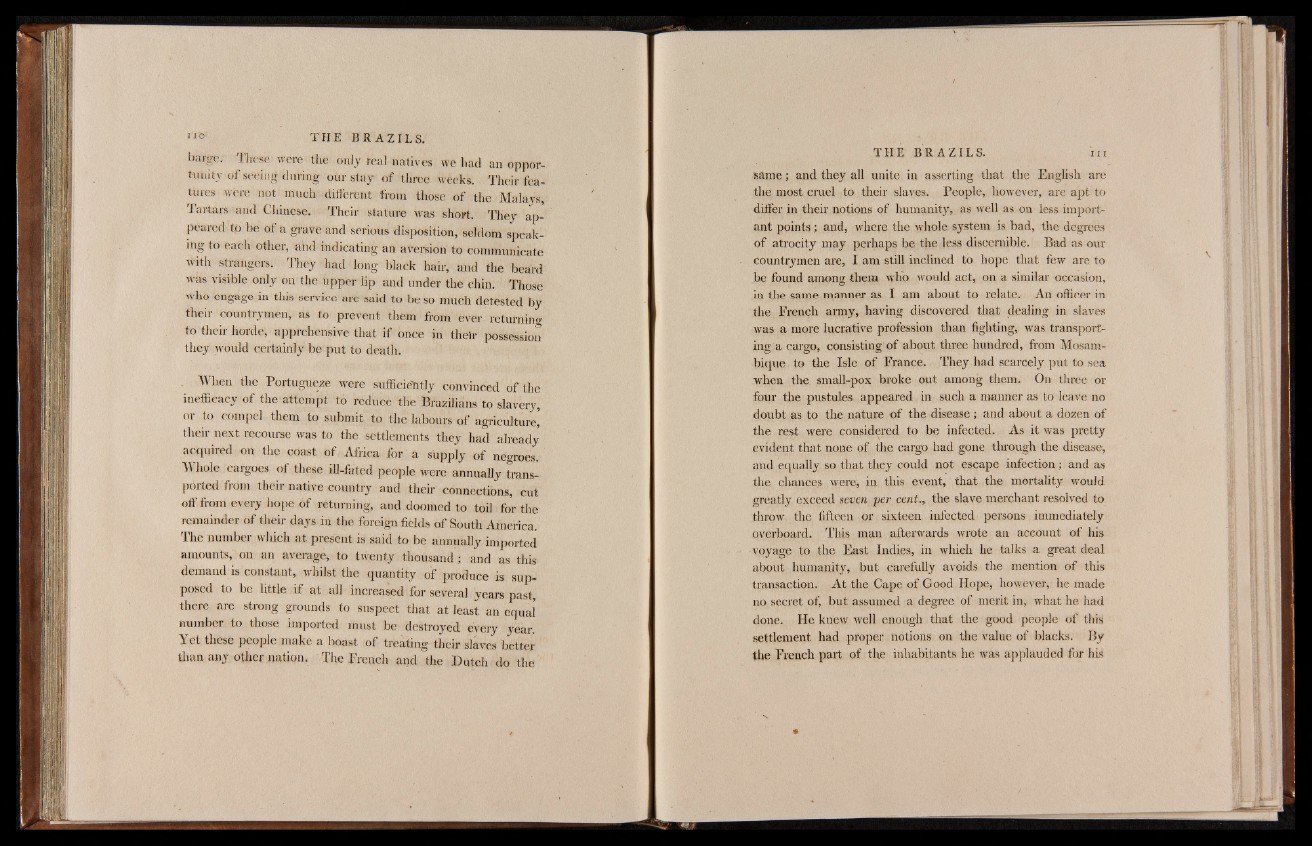
barge. These were the only real natives we had an opportunity
of seeing during our stay of three weeks. Their features
were not much different from those of the Malays,
Tartars and Chinese. Their stature was short. They appeared
to be of a grave and serious disposition, seldom speaking
to each other, and indicating an aversion to communicate
with strangers. They had long black hair, and the beard
was visible only on the upper lip and under the chin. Those
who engage in this service are said to be so much detested by
their countrymen, as to prevent them from ever returnino-
to their horde, apprehensive that if once in their possession
they would certainly be put to death.
When the Portuguese were sufficiently convinced of the
inefficacy of the attempt to reduce the Brazilians to slavery,
or to compel them to submit to the labours of agriculture’
their next recourse was to the settlements they had already
acquired on the coast of Africa for a supply of negroes.
Whole cargoes of these ill-fated people were annually transported
fiom theii native country and their connections, cut
off from every hope of returning, and doomed to toil for the
remainder of their days in the foreign fields of South America.
I he number which at present is said to be annually imported
amounts, on an average, to twenty thousand; and as this
demand is constant, whilst the quantity of produce is supposed
to be little if at all increased for several years past,
there are strong grounds to suspect that at least an equal
number to those imported must be destroyed every year.
Yet these people make a boast of treating their slaves better
than any other nation. The French and the Dutch do the
same; and they all unite in asserting that the English are
the most cruel to their slaves. People, however, are apt to
differ in their notions of humanity, as well as on less important
points; and, where the whole system is bad, the degrees
of atrocity may perhaps be the less discernible. Bad as our
countrymen are, I am still inclined to hope that few are to
be found among them who would act, on a similar occasion,
in the same manner as I am about to relate. An officer in
the French army, having discovered that dealing in slaves
was a more lucrative profession than fighting, was transporting
a cargo, consisting of about three hundred, from Mosam-
bique to the Isle of France. They had scarcely put to sea
when the small-pox broke out among them. On three or
four the pustules appeared in such a manner as to leave no
doubt as to the nature of the disease; and about a dozen of
the rest were considered to be infected. As it was pretty
evident that none of the cargo had gone through the disease,
and equally so that they could not escape infection; and as
the chances were, in this event, that the mortality would
greatly exceed seven per cent., the slave merchant resolved to
throw the fifteen or sixteen infected persons immediately
overboard. This man afterwards wrote an account of his
voyage to the East Indies, in which he talks a great deal
about humanity, but carefully avoids the mention of this
transaction. At the Cape of Good Hope, however, he made
no secret o f but assumed a degree of merit in, what he had
done. He knew well enough that the good people of this
settlement had proper notions on the value of blacks. By
the French part of the inhabitants he was applauded for his